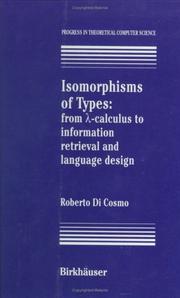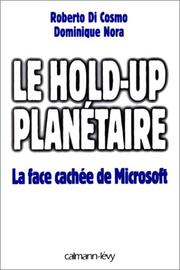| Listing 1 - 7 of 7 |
Sort by
|

ISBN: 9780817637637 081763763X Year: 1995 Publisher: Boston (Mass.): Birkhäuser,
Abstract | Keywords | Export | Availability | Bookmark
 Loading...
Loading...Choose an application
- Reference Manager
- EndNote
- RefWorks (Direct export to RefWorks)

ISBN: 2702129234 9782702129234 Year: 1998 Publisher: Paris: Calmann-Lévy,
Abstract | Keywords | Export | Availability | Bookmark
 Loading...
Loading...Choose an application
- Reference Manager
- EndNote
- RefWorks (Direct export to RefWorks)
Cet ouvrage va à rebours de la mythologie véhiculée par le marketing génial de Microsoft. Il met en garde contre les ambitions démesurées de ce Big Brother: le contrôle total sur toute forme de transmission et de traitement de l'information, aussi bien dans l'éducation que les transactions bancaires, les actuels et futurs médias et jusque dans l'intimité de nos vies privées. Quel mélange de crétinisme technologique et de servilité intellectuelle fallait-il pour laisser Microsoft bâtir en toute impunité une position de monopole, en détruisant bon nombre d'entreprises dont les produits étaient de qualité supérieure? Comment la firme est-elle parvenue à aliéner consommateurs, compétiteurs et distributeurs, en se présentant aujourd'hui comme le champion de la démocratisation du savoir? Au moment où l'Amérique combat par tous les moyens légaux la boulimie de son ogre national, un tel cri d'alarme tombe à point nommé: il existe des alternatives technologiques viables à l'hégémonie de Microsoft, qui permettraient à la fois de diminuer la dépendance européenne et de rapatrier de vrais emplois. La France est en retard, plaident les esprits chagrins. Justement, réplique ce livre, le retard français est notre meilleur atout: nous avons certes raté un train, mais c'est celui qui est en passe de dérailler !
316.7 --- AA / International- internationaal --- US / United States of America - USA - Verenigde Staten - Etats Unis --- 331.00 --- 338.752.7 --- 654 --- 338.52 --- Economische bewegingen: algemeenheden. --- Fijnmechaniek. Precisietoestellen. --- Informatieverwerking. Bureautica. --- Trusts. Holdings. --- Economische bewegingen: algemeenheden --- Fijnmechaniek. Precisietoestellen --- Informatieverwerking. Bureautica --- Trusts. Holdings --- 340 --- informatique --- entreprise --- microsoft --- economie --- économie --- MICROSOFT CORPORATION --- CONCURRENCE --- LOGICIELS --- INFORMATIQUE - INSTITUTION DU COMMERCE - PRATIQUES DELOYALES --- CHAT - ETATS-UNIS --- INSTITUTION DU COMMERCE - ETATS-UNIS --- Logiciels --- Concurrence --- Informatique --- Industrie et commerce --- Droit. --- Pratiques déloyales. --- Gates, Bill, --- Microsoft Corporation. --- États-Unis.
Book
ISBN: 1605586773 Year: 2009 Publisher: ACM
Abstract | Keywords | Export | Availability | Bookmark
 Loading...
Loading...Choose an application
- Reference Manager
- EndNote
- RefWorks (Direct export to RefWorks)
Book

ISBN: 3319577352 3319577344 Year: 2017 Publisher: Cham : Springer International Publishing : Imprint: Springer,
Abstract | Keywords | Export | Availability | Bookmark
 Loading...
Loading...Choose an application
- Reference Manager
- EndNote
- RefWorks (Direct export to RefWorks)
This book is open access under a CC BY license. This book constitutes the refereed proceedings of the 13th IFIP WG 2.13 International Conference on Open Source Systems, OSS 2017, held in Buenos Aires, Argentina, in May 2017. The 16 revised full papers and 3 short papers presented were carefully reviewed and selected from 32 submissions. The papers cover a wide range of topics related to free, libre, and open source software (FLOSS), including: licensing, strategies, and practices; case studies; projects, communication, and participation; tools; and project management, development and evaluation.
Computer science. --- Software engineering. --- Computers. --- Law and legislation. --- Management information systems. --- Computer Science. --- Management of Computing and Information Systems. --- Software Engineering. --- Legal Aspects of Computing. --- Information Systems Applications (incl. Internet). --- Computer-based information systems --- EIS (Information systems) --- Executive information systems --- MIS (Information systems) --- Automatic computers --- Automatic data processors --- Computer hardware --- Computing machines (Computers) --- Electronic brains --- Electronic calculating-machines --- Electronic computers --- Hardware, Computer --- Computer software engineering --- Informatics --- Sociotechnical systems --- Information resources management --- Management --- Computer systems --- Cybernetics --- Machine theory --- Calculators --- Cyberspace --- Engineering --- Science --- Communication systems --- Information Systems. --- Computers --- Law and legislation --- Application software. --- Application computer programs --- Application computer software --- Applications software --- Apps (Computer software) --- Computer software --- open access --- Linux --- open source software --- collaboration --- information systems --- Electronic data processing --- Information technology --- IT Operations. --- Computer and Information Systems Applications. --- Management. --- Technology and law
Book
Year: 2009 Publisher: [Place of publication not identified] Association for Computing Machinery
Abstract | Keywords | Export | Availability | Bookmark
 Loading...
Loading...Choose an application
- Reference Manager
- EndNote
- RefWorks (Direct export to RefWorks)
Book

ISBN: 9791036545627 9791036578403 Year: 2022 Publisher: Paris, Marseille : OpenEdition Press,
Abstract | Keywords | Export | Availability | Bookmark
 Loading...
Loading...Choose an application
- Reference Manager
- EndNote
- RefWorks (Direct export to RefWorks)
For more than twenty years, the international research community has affirmed its support for open and collaborative practices that improve the quality, transparency, reproducibility and inclusiveness of science. In France, this orientation has been reflected in the adoption of two National Plans for Open Science, in 2018 and 2021. In this context and on the occasion of the French Presidency of the Council of the European Union, France organised the Open Science European Conference (OSEC) on 4 and 5 February 2022. This conference on the transformation of the research and innovation ecosystem in Europe was an opportunity to address in particular transparency in health research, the future of scientific publishing and the opening of codes and software produced in a scientific context, but also the necessary transformations of research assessment, summarised in the Paris Call presented during the event and calling for the creation of a coalition of actors committed to reforming the current system. This international event was organised was organised by the French Académie des sciences, the Ministry of Higher Education and Research, the French National Center for Scientific Research (CNRS), the National Institute of Health and Medical Research (Inserm), the High Council for Evaluation of Research and Higher Education (Hcéres), the National Research Agency (ANR), the University of Lorraine and the University of Nantes.
Information Science & Library Science --- scientific publishing --- open science
Book

ISBN: 9791036525155 9791036582707 Year: 2022 Publisher: Paris, Marseille : OpenEdition Press,
Abstract | Keywords | Export | Availability | Bookmark
 Loading...
Loading...Choose an application
- Reference Manager
- EndNote
- RefWorks (Direct export to RefWorks)
Depuis plus de vingt ans, la communauté scientifique internationale affirme son soutien à la science ouverte comme fondement d’une recherche plus collaborative, transparente, intègre et proche de la société. Cette orientation s’est notamment traduite en France par l’adoption de deux Plans nationaux pour la science ouverte, en 2018 et 2021. Dans cette dynamique et à l’occasion de la présidence française du Conseil de l’Union européenne, la France a organisé les 4 et 5 février 2022 les Journées européennes de la science ouverte (OSEC). Cette conférence sur la transformation de l’écosystème de la recherche et de l’innovation en Europe a été l’occasion d’aborder en particulier la transparence des recherches en santé, l’avenir de l’édition scientifique et l’ouverture des codes et logiciels produits dans un contexte de recherche, mais aussi les transformations nécessaires de l’évaluation de la recherche, synthétisées dans l’Appel de Paris présenté lors de ces Journées et appelant à la création d’une coalition d’acteurs engagés pour une réforme du système actuel. Cet événement international a été organisé avec le soutien de l’Académie des sciences, du ministère de l’Enseignement supérieur et de la Recherche, du Centre national de la recherche scientifique (CNRS), de l’Institut national de la santé et de la recherche médicale (INSERM), du Haut Conseil de l’évaluation de la recherche et de l’enseignement supérieur (Hcéres), de l’Agence nationale de la recherche (ANR), de l’Université de Lorraine et de l’Université de Nantes.
| Listing 1 - 7 of 7 |
Sort by
|

 Search
Search Feedback
Feedback About UniCat
About UniCat  Help
Help News
News